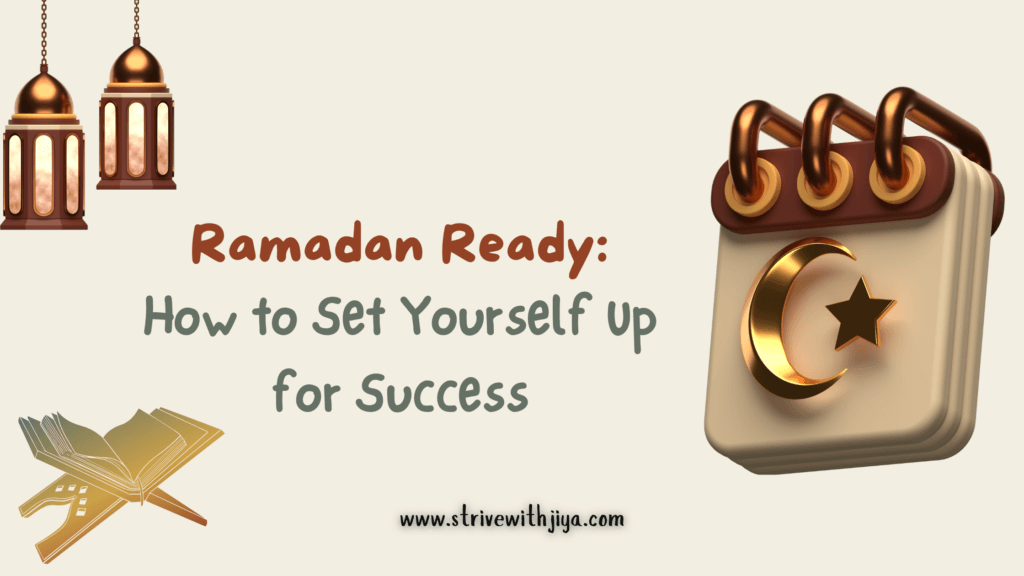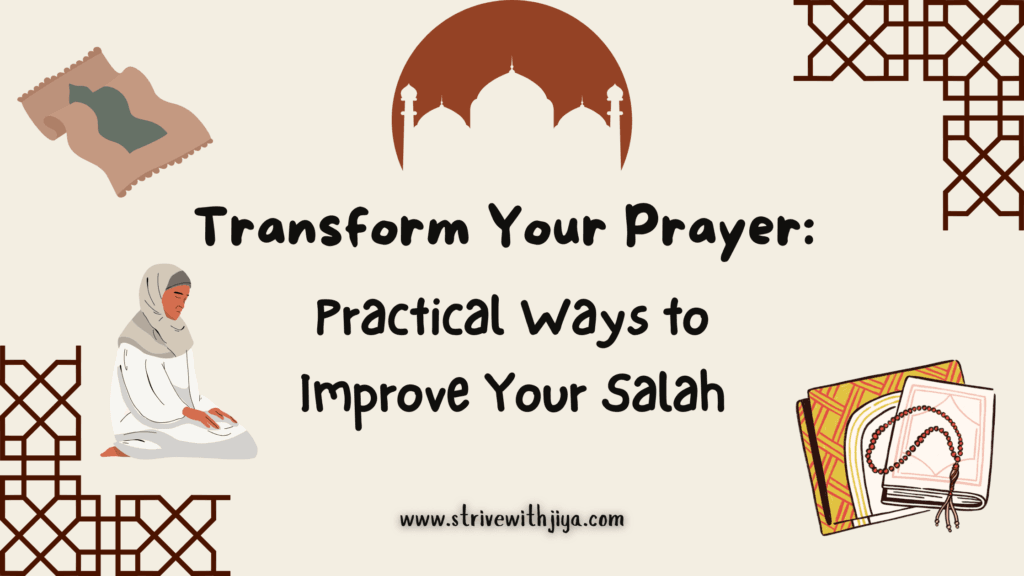
Life can feel messy in ways we don’t always notice at first. Your sleep schedule slips, your motivation fades, your routine feels scattered, and your heart starts to feel distant from Allah. If you’ve been feeling stuck, overwhelmed, or emotionally drained, it might be time for a gentle, intentional reset. In this blog post, you’ll find faith-based ways to reset your life, with a focus on emotional healing, daily habits, and spiritual routines that bring calm and clarity. Whether you’re trying to improve your mental health, reconnect with your deen, or simply build a peaceful and productive Islamic routine, these small shifts can help you realign without burnout or overwhelm.
If you’re ready to feel more grounded, connected, and spiritually refreshed, these simple habits are a great place to start. Remember, this isn’t about flipping a switch, it’s about planting seeds of change. With time, effort, and the help of Allah, these habits can transform your life from the inside out.
1. Prioritize a Good Night’s Sleep
Sleep isn’t just rest, it’s restoration. A good night’s sleep clears your mind, balances your mood, and gives your body the healing it needs. Allah created the day for work and the night for rest, yet many of us spend the quiet hours doom-scrolling or binge-watching shows.
The early mornings are full of Barakah, but we often waste them by sleeping through them. No wonder we feel tired, disconnected, and sluggish. There’s deep wisdom in how Allah designed the cycle of day and night and when we go against that natural rhythm, we face the consequences.
Begin your reset by setting a consistent bedtime, limiting screen time at night, and winding down with dhikr or a calming routine. This one habit alone can shift your entire energy and bring calm back into your life.
Bonus Tip: If your sleep routine is completely off track, I know it’s not easy to fix it overnight. But here’s a way to turn your messed-up routine into a blessing in disguise:
If you’re already staying up late until Fajar, try to spend the last third of the night talking to Allah. Use that time to pray two Rak’ahs and pour your heart out in Dua, especially asking Him to help you fix your routine and bring ease into your life. This way, you’re not just struggling through it, you’re using it as a moment of connection and healing. And when you ask Allah for help, He makes the path easier than you ever expected.
2. Avoid Reaching for Your Phone First Thing
Grabbing your phone the moment you wake up floods your mind with noise, comparison, and distraction before your day even begins. Instead, try waking up slowly, breathe deeply, make a short Dua, express some gratitude, stretch, or simply sit in silence for a few minutes before letting the world in.
You have to try this at least once to feel the difference. Personally, I’ve noticed that I’m much more productive and intentional on the days I don’t scroll first thing in the morning. Save the scrolling for later, as a reward after you’ve completed a few important tasks. It’s a small shift, but it makes a big impact on your mindset.
3. Create a Slow & Intentional Morning Routine
Your morning sets the tone for your entire day. A mindful start doesn’t need to be complicated, freshen up, pray Fajar, hydrate, journal, or read a short Quranic ayah. Keep it peaceful and intentional, and let it remind you of your purpose. Here are some tips:
- Make your bed to create a sense of clarity and achievement, because a clear space leads to a clear mind.
- If your room feels messy, set a five-minute timer and do a quick cleanup. It doesn’t have to be perfect, just enough to shift the energy of your space.
- Bring more Barakah into your mornings by spending even a few minutes with the Quran.
- You can also play a recitation or Ruqyah softly in the background while you get ready or make breakfast.
- Don’t skip your morning Adhkaar, they’re a powerful shield for your day.
- And don’t forget breakfast, it truly is the most important meal of the day. Try to have something healthy and nourishing.
- Lastly, take a few minutes to jot down your to-do list. Getting everything out of your head and onto paper helps you start the day with focus and calm.
4. Add Wholesome Foods to Your Day
Your body is an Amanah (a trust), and taking care of it is an act of gratitude. Nourishing yourself isn’t about cutting out everything “bad”, it’s about slowly adding in what’s good. Start by including more fruits, water, herbal teas, and wholesome meals. Even one small, healthy choice is a reset.
Take time to learn what a balanced diet looks like and make small changes with intention. For example, eating black seeds is a Sunnah, and the Prophet ﷺ said they contain a cure for every disease except death. You can sprinkle some on your breakfast eggs or salads.
Try pairing desi meals with simple sides like fresh salad or yogurt. Eat mindfully, and with the intention to nourish your body for the sake of Allah. Make it a habit to ask Allah for Shifa (healing) every time you eat, turning every bite into a source of blessing.
5. Move Your Body Daily
Movement isn’t just for fitness, it’s a form of therapy. A short walk, some light stretching, or a quick workout can completely shift your mindset. Moving your body helps release stuck emotions and energy, bringing both physical and mental relief.
You don’t need a gym or intense routines to get started. Walk around your home, stretch while listening to a podcast, or search for easy exercise or yoga tutorials online. Even just 10 minutes of movement a day can make a noticeable difference in how you feel.
You’d be surprised how many simple and enjoyable routines are out there, you just need to spend a little time finding one that suits you. Some workouts are so gentle you can literally do them in bed. Set aside half an hour, browse YouTube, and pick something light that feels good. Once you find it, commit to showing up for yourself. It’s one of the kindest things you can do for your mind and body.
6. Start with Small, Consistent Habits
Resetting your life doesn’t mean flipping everything upside down overnight. It’s about small, realistic changes done consistently, day by day.
Want to drink more water? Start with one glass in the morning. Want to build a connection with the Quran? Begin with just one verse a day. The key is to start small and slowly work your way upwards. Show up consistently, and over time, those small steps will compound into something meaningful.
You have to understand: a life reset takes time, energy, intention, and patience. You can’t rush this process if you want lasting, sustainable change. There will be setbacks, and that’s okay. What matters is reminding yourself why you’re doing this.
And when it feels hard or messy….pause, breathe, and make a heartfelt Dua. Ask Allah to help you, to bring ease, and to guide you gently back on track. Because you’re not doing this alone and that’s what makes it all possible.
7. Set Systems, Not Just Goals
Goals give you direction, but systems are what create real change. It’s easy to say, “I want to pray Tahajjud,” but without a plan, that intention fades quickly. Instead, build a system around it: sleep earlier, set an alarm, and create a peaceful pre-bed routine. Systems are what keep you going when motivation fades.
Whatever your goal is, whether it’s spiritual, personal, or practical, don’t stop at just naming it. Make it easy and accessible. Break it down into small, clear steps. What will it take to get there? What do you need to do daily or weekly? Write it all down.
Create a plan that’s realistic, simple, and even enjoyable. Track your progress. Set reminders. Eliminate distractions. When you build a strong system, you’re more likely to follow through and more likely to feel fulfilled in the process.
8. Make Istaghfar a Daily Practice
Seeking forgiveness softens the heart and unblocks the soul. The Prophet ﷺ, who was promised Jannah and lived a life of complete obedience, used to say Astaghfirullah more than 70 times a day. If he, the most perfect example for us, constantly sought forgiveness, how can we ever think we don’t need to?
Try repeating Astaghfirullah while doing chores, walking, cooking, or before sleeping. It’s a beautiful way to reset your heart and reconnect with Allah.
The benefits of Istighfar are beyond words, it’s not just about repenting for sins. It’s a gateway to ease, blessings, and even provision. As mentioned in the Qur’an:
“Ask forgiveness from your Lord; verily, He is Oft-Forgiving. He will send rain to you in abundance, increase you in wealth and children, and bestow upon you gardens and rivers.”
— Surah Nuh (71:10–12)
I plan to write a separate post fully dedicated to the power of Istighfar, InshaAllah. But for now, my advice is this: try to say it at least 100 times a day. You can set aside 5 minutes for Istaghfar, do it after your prayers, while walking, driving, cleaning, or during daily tasks. Make it a habit. You’ll start to feel the difference within your heart and in your life.
9. Plan Your Day Around Salah
Instead of squeezing Salah into a packed schedule, build your day around it. Let it be your anchor, something your entire day flows between. This simple shift brings immense Barakah into your time and aligns your routine with your true purpose.
Salah should be your top priority. When its time comes, pause everything and prepare for it. Make Wudhu with intention. Don’t rush. Sit for a few moments before praying to clear your mind and remind yourself: you’re about to stand before your Lord. You’re not just going through motions, you’re having a conversation with Allah.
Try to be mindful during your prayers. Even if your thoughts wander, gently bring your focus back every time you notice. It’s okay. What matters is that you keep returning.
Spend time learning about the meanings of the verses you recite, and reflect on the actions of Salah. The more you understand, the more your heart will be present. And the more your heart is present, the more peace and clarity you’ll find. I have shared some tips on how to improve your Salah here!
10. The Power of Dua
Dua is your direct line to Allah. Talk to Him in your own words. Whether you’re confused, grateful, hurting, or just tired…turn to Him. He’s always listening.
Start by making Dua after every Salah, during walks, while doing chores, or even as you lie in bed. It’s a gentle way to reset your inner world. The more you make Dua, the closer you’ll feel to Allah.
Make it a habit to turn to Him for everything, big or small. Even if you need something as simple as a needle, ask Him. Nothing is too small for Allah, and nothing is too big.
If you’re having a rough day, ask Him for ease. If you’re feeling low, ask Him for healing. When starting something new, ask Him to bless it and make it easy for you. When you build this habit of constantly turning to Allah, you’ll begin to develop a deep, personal bond with Him.
Make Allah your closest friend and you’ll start to witness quiet miracles unfold in your life.
11. Live with Taqwa and Ihsan (God-Consciousness & Excellence)
Taqwa and Ihsan are two spiritual mindsets that can quietly transform your entire life. I will create a seperate post on this topic soon InShaAllah!
Taqwa is living with the awareness that Allah is always with you. It helps you pause before reacting, speak with kindness, stay honest, and constantly ask yourself, “Is this pleasing to Allah?” That one question can redirect your intentions and actions, aligning your life with your faith.
Ihsan is doing everything as if Allah is watching you, even when no one else is. Whether you’re praying, working, cleaning, or creating…do it with sincerity, care, and presence.
When you cultivate both Taqwa and Ihsan, your everyday actions become acts of worship. You feel more grounded, your connection with Allah deepens, and Barakah begins to flow into every corner of your life.
12. Start Every Task with Bismillah
There’s something powerful about beginning everything with Bismillah, “In the name of Allah.” It’s a way of inviting His presence, His help, and His blessings into even the smallest parts of your day.
Starting with Bismillah shifts your mindset. It’s a reminder that nothing is too ordinary for Allah to be part of. Whether you’re cutting fruit, pouring water, opening your laptop, or picking up your phone…say Bismillah. It’s a moment of awareness, a pause before action, and a subtle act of worship.
The Prophet ﷺ taught us to begin everything with the name of Allah and when you make this a habit, you’ll notice how much more peace and Barakah begin to flow into your daily life. It’s a small phrase with a huge impact.
Start Small, Stay Sincere
Resetting your life doesn’t have to be loud or dramatic. Sometimes, it’s in the quiet shifts, the whispered Bismillah, the deep breath before Fajr, the choice to make Dua instead of giving up.
You don’t need to do everything at once. Begin with just one small change. Build on it with sincerity and trust that Allah sees your effort. There will be ups and downs, but what matters is that you keep turning back, again and again, with an open heart.
Your journey is sacred. Let it be slow, intentional, and full of meaning. May Allah fill your days with Barakah, clarity, and healing. Ameen.
If this post helped you, save it for later, share it with someone who might need it, or leave a comment, I’d love to hear what resonated most with you.






Pingback: When Advice Hurts More Than It Helps - Strive With Jiya